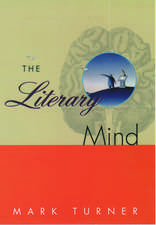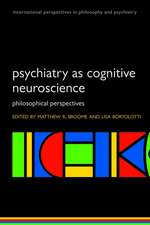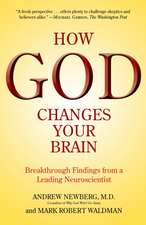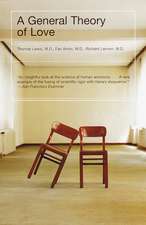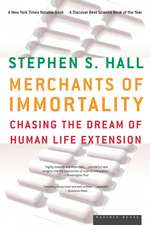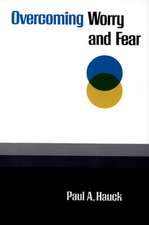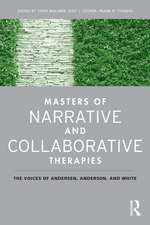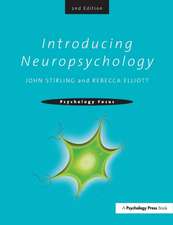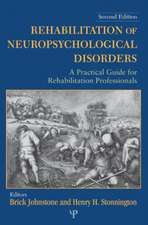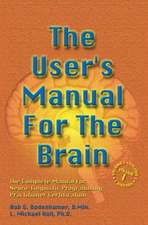Wisdom: From Philosophy to Neuroscience
Autor Stephen S. Hallen Limba Engleză Paperback – 28 feb 2011
Preț: 113.15 lei
Nou
Puncte Express: 170
Preț estimativ în valută:
21.65€ • 22.61$ • 17.88£
21.65€ • 22.61$ • 17.88£
Carte disponibilă
Livrare economică 25 martie-08 aprilie
Preluare comenzi: 021 569.72.76
Specificații
ISBN-13: 9780307389688
ISBN-10: 0307389685
Pagini: 333
Dimensiuni: 134 x 203 x 19 mm
Greutate: 0.26 kg
Editura: Vintage Books USA
ISBN-10: 0307389685
Pagini: 333
Dimensiuni: 134 x 203 x 19 mm
Greutate: 0.26 kg
Editura: Vintage Books USA
Recenzii
“A fascinating attempt to understand one of our most cherished—but least well-understood-aspirations.”
—Seed Magazine
“With the flair of an experienced science journalist, Hall takes us on a rollicking interdisciplinary journey through the ages, blending modern science, history and philosophy. . . . Highly readable.”
—Nature Neuroscience
“A comprehensive and thought-provoking book that examines the difficult topic of wisdom in a fair—even wise—manner.”
—Science News
“Utterly engaging. . . . Hall’s work as a translator and intermediary between the humanities and the hard neurosciences is in itself a feat of extraordinary mental balance and understanding.”
—The Post and Courier
“Stephen Hall is not just a terrific science writer, he’s a terrific writer, period.”
—Michael Pollan, author of The Omnivore’s Dilemma
“Wisdom is a golden-ticket tour of the human mind, in all its dimensions, led by one of the most insightful and trustworthy science journalists we’ve ever had. This book is a feast, not a snack. Get ready to digest more smart brain science than you ever thought possible.”
—David Shenk, author of The Genius in All of Us: Why Everything You’ve Been Told About Genetics, Talent, and IQ Is Wrong
“Astonishingly wise, incredibly well written and most importantly wonderfully synthetic. One can disagree with some of the parts but few will disagree with the whole. Wisdom is still with us.”
—Michael Gazzaniga, author of Human: The Science Behind What Makes Us Unique
“Steve Hall has done it again. He masterfully explains how ‘wisdom’ comes out of the brain without oversimplifying this enormously complex topic.”
—Joseph LeDoux, Synaptic Self: How Our Brains Become Who We Are
“With erudition and literary skill, Stephen Hall brings us a powerful and perceptive synthesis of the contributions made by philosophers, theologians, and 21st century scientists to humankind’s ages-old search for the sources of wisdom. As a work of insight and art, this is indeed a wise book.”
—Sherwin Nuland, author of How We Die: Reflections of Life’s Final Chapter
—Seed Magazine
“With the flair of an experienced science journalist, Hall takes us on a rollicking interdisciplinary journey through the ages, blending modern science, history and philosophy. . . . Highly readable.”
—Nature Neuroscience
“A comprehensive and thought-provoking book that examines the difficult topic of wisdom in a fair—even wise—manner.”
—Science News
“Utterly engaging. . . . Hall’s work as a translator and intermediary between the humanities and the hard neurosciences is in itself a feat of extraordinary mental balance and understanding.”
—The Post and Courier
“Stephen Hall is not just a terrific science writer, he’s a terrific writer, period.”
—Michael Pollan, author of The Omnivore’s Dilemma
“Wisdom is a golden-ticket tour of the human mind, in all its dimensions, led by one of the most insightful and trustworthy science journalists we’ve ever had. This book is a feast, not a snack. Get ready to digest more smart brain science than you ever thought possible.”
—David Shenk, author of The Genius in All of Us: Why Everything You’ve Been Told About Genetics, Talent, and IQ Is Wrong
“Astonishingly wise, incredibly well written and most importantly wonderfully synthetic. One can disagree with some of the parts but few will disagree with the whole. Wisdom is still with us.”
—Michael Gazzaniga, author of Human: The Science Behind What Makes Us Unique
“Steve Hall has done it again. He masterfully explains how ‘wisdom’ comes out of the brain without oversimplifying this enormously complex topic.”
—Joseph LeDoux, Synaptic Self: How Our Brains Become Who We Are
“With erudition and literary skill, Stephen Hall brings us a powerful and perceptive synthesis of the contributions made by philosophers, theologians, and 21st century scientists to humankind’s ages-old search for the sources of wisdom. As a work of insight and art, this is indeed a wise book.”
—Sherwin Nuland, author of How We Die: Reflections of Life’s Final Chapter
Notă biografică
For twenty-five years, Stephen S. Hall has written about the intersection of science and society in books, magazine articles, and essays, primarily in The New York Times Magazine. He is the author of five previous critically acclaimed books, including Invisible Frontiers and Merchants of Immortality. He has received numerous awards, including in 2004 the Science in Society Journalism Award for book writing from the National Association of Science Writers and, in 1998, the William B. Coley Award from the Cancer Research Institute. In addition to science, Hall has written extensively about travel, baseball, and Italy. He lives in Brooklyn, New York, with his wife and two children.
Visit the author's website at: www.stephenshall.com.
Visit the author's website at: www.stephenshall.com.
Extras
PART ONE
Wisdom Defined
(Sort Of)
You, my friend . . . are you not ashamed . . . to care so little about wisdom and truth and the greatest improvement of the soul, which you never regard or heed at all?
—Socrates, defending himself at his trial
CHAPTER ONE
WHAT IS WISDOM?
The days of our life are seventy years,
or perhaps eighty if we are strong;
even then their span is only toil and trouble;
they are soon gone, and we fly away . . .
So teach us to count our days
that we may gain a wise heart.
—Psalm 90
That man is best who sees the truth himself,
Good too is he who listens to wise counsel.
But who is neither wise himself nor willing
To ponder wisdom is not worth a straw.
—Hesiod
ON A BEAUTIFUL FALL MORNING nearly a decade ago, like hundreds of mornings before and since, I dropped off one of my children at school. Micaela, then five years old, had just started first grade, and the playground chatter among both the children and their parents reflected that mix of nervous unfamiliarity and comforting reconnection that marks the beginning of the school year. I lingered in the schoolyard until Micaela lined up with her teacher and classmates. She wore a pretty purple dress that my mother had just sent her, white socks, and pink-and-white-checkered sneakers. A hair band exposed her hopeful, eager, beautiful face. I sneaked in a last hug, as impulsive dads are wont to do, before she disappeared into the building. The time was about 8:40 a.m.
As I left the schoolyard and began to head toward the subway and home to Brooklyn, I heard a thunderous, unfamiliar roar overhead. As the noise grew louder and closer, I froze in an instinctive crouch, much like the rats we always read about in scientific experiments on fear, wondering where the sound was coming from, knowing only that it was ominously out of the ordinary. Moments later, a huge shadow with metal wings passed directly over my head, like some prehistoric bird of prey. I instantly recognized it as a large twin-engine commercial airliner, but nothing in my experience prepared me for what happened next. I watched for the endless one . . . two . . . three . . . four seconds it took for this shiny man-made bird to fly directly into the tall building that I faced several blocks away. In real time, I watched a 395,000-pound airplane simply disappear. Almost immediately black smoke began to curl out of the cruel, grinning incision its wings had sliced in the façade of the skyscraper.
In moments when life’s regular playbook flies out the window, when the ground shifts beneath our feet in a literal or figurative earthquake, we feel a surge of adrenalized fear at the shock of the unexpected. But right behind that feeling comes the struggle to make sense of the seemingly senseless, to try to understand what has just happened and what it means so that we will know how to think about a future that suddenly seems uncertain and unpredictable. In truth, the future is always unpredictable, which is why these moments of shock remind us, with unusual urgency, that we have a constant (if often unconscious) need for wisdom, too.
Although we now all know exactly what happened that terrible morning, the ground truth in lower Manhattan on September 11, 2001, was much fuzzier at 8:45 a.m. One of the hallmarks of wisdom, what distinguishes it so sharply from “mere” intelligence, is the ability to exercise good judgment in the face of imperfect knowledge. In short, do the right thing—ethically, socially, familiarly, personally. Sometimes, as on this day, we have to deliberate these decisions in the midst of an absolutely roaring neural stew of conscious and unconscious urgings. In one sense, I knew exactly what had happened long before the first news bulletin hit the airwaves. In a larger sense, someone watching television in Timbuktu soon knew vastly more about the big picture than I did. This may be an exaggerated example, but it is in precisely the murk of this kind of confusion that we often have to make decisions. So what did I do?
I went to a nearby shop and bought a cup of coffee.
It didn’t occur to me until much later that this was a decision of sorts—perhaps a foolish one, and certainly not an obvious one. But to the extent that I mustered even a dram of wisdom that day, it was in how I viewed the situation and what I thought was most important. Oddly, I felt little or no physical threat, despite such close proximity to the unfolding disaster; in some respects, the event played much scarier on TV than in person. My immediate focus, even then, was on the long-term psychological impact that such a calamity might have on a young child, and what (if anything) a parent might do to minimize it. I hadn’t quite understood yet that that would be my mission for the day, but by standing in the street and sipping a cup of coffee, in that mysterious shorthand of human choice, I had chosen to stay close to my daughter, to stay calm, and, failing that, to fake parental calm realistically enough to convince her that this was a situation we could deal with.
But she didn’t need to see the whole movie. I did not think it was a good idea for a young child to witness, as I did, human bodies falling like paperweight angels from the upper floors of the nearby tower. Even more, I did not think it was a good idea for a young child to absorb, even for a moment, the panic and despair written on the faces of all the adults who were beginning to comprehend that the world as they had known it, even a few minutes earlier, had suddenly changed, slipping irrevocably out of their (however illusionary) controlling grasp.
If you’re thinking that I’m offering a smug little narrative about wise parenting, not to worry. Wisdom doesn’t come easily to us mortals, and I’ve been reminded many times since that it probably didn’t come to me that day, either. Many of the choices I made that morning were second-guessed by my wife, by my friends, and even by my daughter. More to the point, my small-minded plan to buffer Micaela’s emotional experience was rudely interrupted by the collapse of 500,000 tons of metal, concrete, and glass. Just as teachers began to evacuate children from the school, the second tower came down, unleashing the kind of apocalyptic roar no child should ever have to hear, and a huge pyroclastic cloud of debris came boiling up Greenwich Street toward us. You couldn’t tell if the cloud was going to reach us or not, but it wasn’t a moment for contemplation. I picked up Micaela and we joined a horde of people running up the street. As I carried her in my arms, swimming upriver in a school of panicked fish, she was forced to look backward, downtown, right into the onrushing menace of our suddenly dark times. Even to this day, however, the thing Micaela remembers most about the evacuation is the moment her classmate Liam accidentally walked into a street sign when he wasn’t looking.
It will be a long time, if ever, before I know if I acted wisely on 9/11. Indeed, it didn’t even occur to me until I was writing this passage that the most important decision I made that day did not even rise to the level of conscious choice. I “decided,” without any conspicuous deliberation, that I had to be a parent first, not a journalist, on that particular morning. At one level, it was an obvious choice; at another, it went against self-interest, career, my professional identity, taking advantage of being an eyewitness to the biggest story of my lifetime. What was I thinking?
That, in a sense, is what I want this book to be about: How do we make complex, complicated decisions and life choices, and what makes some of these choices so clearly wise that we all intuitively recognize them as a moment, however brief, of human wisdom? What goes on in our heads when we’re struggling to be patient and prudent, and are there ways to enhance those qualities? When we’re being foolish, on the other hand, do our brains make us do it? And how does the passage of time, and our approaching mortality, change our thought processes and perhaps make us more amenable to wisdom?
In moments of exceptional challenge and uncertainty, we tend to ask, How did this happen? What could we have done to prevent this dire turn of events? This is another way of saying, I realize now, that we are always searching for wisdom, but all too often we are looking for it in the rearview mirror, sifting the past for clues to how we might have thought about the future in a different way.
We crave wisdom—worship it in others, wish it upon our children, and seek it ourselves—precisely because it will help us lead a meaningful life as we count our days, because we hope it will guide our actions as we step cautiously into that always uncertain future. At times of challenge and uncertainty, nothing seems more important than wisdom—economic wisdom, moral wisdom, political wisdom, even that private, behind-closed-doors wisdom that allows us to convey the gravity of changed circumstances to our children without making them afraid of change itself.
Nothing seems more important, yet nothing seems more beyond our grasp, until we begin to think about wisdom before we think we need it.
I am not an expert on wisdom (in the most important sense, none of us is). I’m just a journalist who for many years has written about science, which in some circles even further disqualifies me from having anything of value to say about wisdom. But all of us find ourselves in situations that demand it, and we don’t need a 9/11 or a cataclysmic economic collapse to bring our desire for wisdom front and center. A car accident, the loss of a job, sudden illness, a floundering relationship, deep disagreements with parents or children—any old run-of-the-mill crisis will do.
We all aspire to have wisdom. Not necessarily because it will guarantee us happier, more fulfilling, better lives (although those have been worthy goals almost from the moment philosophers began to contemplate it), but because wisdom as a process can serve as a guide to helping us make the best-possible decisions at junctures of great importance in our lives. With an added, implicit (or sometimes explicit) tincture of mortality, it can get us to slow down long enough to think about actions and consequences. It can help us frame problems in a different way, allowing us to see unexpected solutions. It can help us maximize the good we do not only in the intimate community of family and friends but also in the larger communities that define our social identity as neighbors, residents, citizens, congregants, and custodians of the planet.
Many of these decisions are years in the planning and preparation, like selecting a mate or choosing a career. Some of them arrive with the roar of a hijacked plane or the suddenness of a phone call from the doctor. At the same time, we can’t separate those crossroads moments from the “vehicle,” the lifetime of experiences, that brought us to the intersection in the first place. Was this vehicle well maintained? Was it tested in all sorts of emotional weather, on every kind of situational terrain? Wisdom resides not just in the decision per se but also, as Confucius perhaps best of all philosophers shrewdly understood, in the Way of life—what he called gen—that precedes the decision.
Decision making lies at the heart of wisdom, but it’s not the whole story. Making those decisions, in turn, draws on a subtle weave of intellectual, emotional, and social gifts—gathering information, discerning the reality behind artifice (especially when it comes to human nature), evaluating and editing that accumulated knowledge, listening to one’s heart and one’s head about what is morally right and socially just, thinking not only of oneself but others, thinking not only in the here and now but about the future. Even in times of crisis, however, wisdom sometimes demands the paradoxical decision to resist doing something just for the sake of doing it—that flailing impulse “to do something, anything” that social scientists sometimes call the “action bias.” “Some of the wisest and most devout men,” the French essayist and philosopher Michel de Montaigne observed, “have lived avoiding all noticeable actions.”
If wisdom weren’t important, no one would even bother arguing about its definition. But that’s the point: It is important, and every one of us, because we do lead lives and want those lives to be as good as they can be, is, to a certain extent, an expert in wisdom, even if (as is certainly the case with almost all of us) it is an expertise grounded in want, not possession. All of us have an intuitive sense of what wisdom means and what constitutes wise behavior. In a rough, nonacademic sense (to paraphrase Supreme Court Justice Potter Stewart’s famous opinion about pornography), we know it when we see it, even if we can’t define it.
That may suffice as a satisfyingly casual approach to personal philosophy, but such definitional squishiness usually makes for bad science, and this is, in many ways, a book about science’s improbable exploration (if not annexation) of one of philosophy’s most prized duchies. No one in a modern laboratory would argue that wisdom is a tractable subject for research; many scientists reasonably view it as something like intellectual libel to suggest that experiments in their labs have anything whatsoever to do with such a fuzzy topic. Even social scientists have trodden lightly; Paul B. Baltes, who probably studied wisdom with more depth and empirical rigor than any other psychologist in the modern era, spoke of a “fuzzy zone” of wisdom, where human expertise never quite rises to an idealized level of knowledge about the human condition.
But the struggle to define wisdom is embedded in the texture of its philosophical, psychological, and cultural history. And every time we think about it, every time we make the mighty effort to pause and contemplate a potential role for wisdom in whatever we are about to do or say, we join that noble struggle and move a step closer to achieving it. In trying to define wisdom, we are not merely engaging in a dry academic exercise. We are, in a fundamental and indeed essential sense, engaging in a conversation with ourselves about how to lead the best-possible life. We are engaging in a conversation with ourselves about who we want to be by the time we complete that journey and, in the words of Psalm 90, “fly away.”
Wisdom begins with awareness, of the self and the world outside the self; it deepens with our awareness of the inherent tension between the inner “I” and the outer world.
I began to realize this when I was asked to write an article for The New York Times Magazine about wisdom research—or, as the cover line asked, “Can Science Tell Us Who Grows Wiser?” As I quickly discovered, there’s no shortage of definitions of wisdom, and no dearth of disagreement about them; in an academic anthology entitled Wisdom: Its Nature, Origins, and Development, published in 1990, there are thirteen separate chapters written by prominent psychologists, and each one offers a different definition of wisdom. As Robert J. Sternberg succinctly put it, “To understand wisdom fully and correctly probably requires more wisdom than any of us have.”
But thinking about wisdom nudges us closer to the thing itself. Every time I encountered a new definition of wisdom, or some argument from the psychological literature, I found myself considering my own life: my decisions, my values, my shortcomings, my choices in confronting difficult practical and moral dilemmas. If some psychologist had identified emotional evenhandedness as a component of wisdom, I would pause to consider my own emotional behavior. What set me off emotionally, and what kinds of decisions did I make—things said, actions taken, tone of voice and physical vocabulary—when I had to deal, for example, with a frustrating situation with professional colleagues or with my children’s inconvenient moments of emotional demand? When compassion emerged as a central component, I was forced to consider the limitations and inconsistencies of my own behavior. When I read the work of Baltes, who believed that dealing with ambiguity and uncertainty was a central aspect of modern wisdom, I realized that moments of ambiguity and uncertainty are often the most stressful and challenging of our lives. (This form of self-consciousness reminded me of the way I used to obsess about diseases when I wrote about medical conditions, but this was more like a philosophical form of hypochondria, much less scary and much more illuminating.) With each new question, I realized that I had unwittingly embarked on an impromptu program of mental exercise, an informal calisthenics of self-awareness.
As I burrowed deeper into the literature of wisdom, I found myself silently mouthing the same question over and over to myself whenever I confronted a problem or dilemma: What would be the wisest thing to do here? I won’t say I acted wisely—as Baltes and many others have pointed out, wisdom is more an ideal aspiration than a state of mind or a pattern of behavior that we customarily inhabit. But simply framing a decision in those terms was intellectually and emotionally bracing. I came away from this experience discovering (in the process of researching and writing a brief magazine article) that as soon as you are confronted with a definition of wisdom, however provisional or tentative, however debatable or howlingly inadequate, you are forced to view that definition through the prism of your own history and experience. Which is another way of saying that we all have a working definition of wisdom floating around in our heads, but we are rarely forced to consider it, or consult it, or challenge it, or amend it, much less apply any standard of wisdom to gauge our own behavior and decisions on a daily basis.
Simply put, thinking about wisdom forces you to think about the way you lead your life, just as reading about wisdom, I believe, forces you to wrestle with its meaning and implications. You might come to think of this exercise, as I have, as an enlightened form of self- consciousness, almost an armchair form of mindfulness or meditation that cannot help but inform our actions. And that’s another key point: to separate wisdom from action is a form of malpractice in the conduct of one’s life. “We ought to seek out virtue not merely to contemplate it,” Plutarch wrote, “but to derive benefit from doing so.”
Soon, whenever I found myself in a challenging situation—refereeing a sibling spat, confronting interpersonal friction with a loved one or friend, being called upon to deal with something that triggered titanic forces of procrastination, or even weighing a trivial dilemma of daily compassion, such as deciding whether to give a poor person some spare change—I felt myself slowing down long enough to ask myself that question: What would be the wisest thing to do? I realize this was very small potatoes compared to Mother Teresa working in the slums of Calcutta or Martin Luther King, Jr., marching on Selma, and I won’t say I did this all the time—a conscientiously wise person might easily experience an existential form of rigor mortis, paralyzed by serial episodes of deliberation.
But I found it a refreshing exercise. It forced me to clarify choices. It slowed down the clock of urgency against which we all seem to be racing as we struggle with decisions. It allowed me to step outside of myself and momentarily stifle the urges of my innate selfishness—second to none, I submit, yet probably pretty much equivalent to everybody else’s—long enough to see a bigger picture. It had an archaic but familiar quality of self-monitoring. It felt, for lack of a better word, responsible—not in the sense that others hold us responsible, but, rather, in terms of raising the bar of expectations we hold for ourselves.
From the Hardcover edition.
Wisdom Defined
(Sort Of)
You, my friend . . . are you not ashamed . . . to care so little about wisdom and truth and the greatest improvement of the soul, which you never regard or heed at all?
—Socrates, defending himself at his trial
CHAPTER ONE
WHAT IS WISDOM?
The days of our life are seventy years,
or perhaps eighty if we are strong;
even then their span is only toil and trouble;
they are soon gone, and we fly away . . .
So teach us to count our days
that we may gain a wise heart.
—Psalm 90
That man is best who sees the truth himself,
Good too is he who listens to wise counsel.
But who is neither wise himself nor willing
To ponder wisdom is not worth a straw.
—Hesiod
ON A BEAUTIFUL FALL MORNING nearly a decade ago, like hundreds of mornings before and since, I dropped off one of my children at school. Micaela, then five years old, had just started first grade, and the playground chatter among both the children and their parents reflected that mix of nervous unfamiliarity and comforting reconnection that marks the beginning of the school year. I lingered in the schoolyard until Micaela lined up with her teacher and classmates. She wore a pretty purple dress that my mother had just sent her, white socks, and pink-and-white-checkered sneakers. A hair band exposed her hopeful, eager, beautiful face. I sneaked in a last hug, as impulsive dads are wont to do, before she disappeared into the building. The time was about 8:40 a.m.
As I left the schoolyard and began to head toward the subway and home to Brooklyn, I heard a thunderous, unfamiliar roar overhead. As the noise grew louder and closer, I froze in an instinctive crouch, much like the rats we always read about in scientific experiments on fear, wondering where the sound was coming from, knowing only that it was ominously out of the ordinary. Moments later, a huge shadow with metal wings passed directly over my head, like some prehistoric bird of prey. I instantly recognized it as a large twin-engine commercial airliner, but nothing in my experience prepared me for what happened next. I watched for the endless one . . . two . . . three . . . four seconds it took for this shiny man-made bird to fly directly into the tall building that I faced several blocks away. In real time, I watched a 395,000-pound airplane simply disappear. Almost immediately black smoke began to curl out of the cruel, grinning incision its wings had sliced in the façade of the skyscraper.
In moments when life’s regular playbook flies out the window, when the ground shifts beneath our feet in a literal or figurative earthquake, we feel a surge of adrenalized fear at the shock of the unexpected. But right behind that feeling comes the struggle to make sense of the seemingly senseless, to try to understand what has just happened and what it means so that we will know how to think about a future that suddenly seems uncertain and unpredictable. In truth, the future is always unpredictable, which is why these moments of shock remind us, with unusual urgency, that we have a constant (if often unconscious) need for wisdom, too.
Although we now all know exactly what happened that terrible morning, the ground truth in lower Manhattan on September 11, 2001, was much fuzzier at 8:45 a.m. One of the hallmarks of wisdom, what distinguishes it so sharply from “mere” intelligence, is the ability to exercise good judgment in the face of imperfect knowledge. In short, do the right thing—ethically, socially, familiarly, personally. Sometimes, as on this day, we have to deliberate these decisions in the midst of an absolutely roaring neural stew of conscious and unconscious urgings. In one sense, I knew exactly what had happened long before the first news bulletin hit the airwaves. In a larger sense, someone watching television in Timbuktu soon knew vastly more about the big picture than I did. This may be an exaggerated example, but it is in precisely the murk of this kind of confusion that we often have to make decisions. So what did I do?
I went to a nearby shop and bought a cup of coffee.
It didn’t occur to me until much later that this was a decision of sorts—perhaps a foolish one, and certainly not an obvious one. But to the extent that I mustered even a dram of wisdom that day, it was in how I viewed the situation and what I thought was most important. Oddly, I felt little or no physical threat, despite such close proximity to the unfolding disaster; in some respects, the event played much scarier on TV than in person. My immediate focus, even then, was on the long-term psychological impact that such a calamity might have on a young child, and what (if anything) a parent might do to minimize it. I hadn’t quite understood yet that that would be my mission for the day, but by standing in the street and sipping a cup of coffee, in that mysterious shorthand of human choice, I had chosen to stay close to my daughter, to stay calm, and, failing that, to fake parental calm realistically enough to convince her that this was a situation we could deal with.
But she didn’t need to see the whole movie. I did not think it was a good idea for a young child to witness, as I did, human bodies falling like paperweight angels from the upper floors of the nearby tower. Even more, I did not think it was a good idea for a young child to absorb, even for a moment, the panic and despair written on the faces of all the adults who were beginning to comprehend that the world as they had known it, even a few minutes earlier, had suddenly changed, slipping irrevocably out of their (however illusionary) controlling grasp.
If you’re thinking that I’m offering a smug little narrative about wise parenting, not to worry. Wisdom doesn’t come easily to us mortals, and I’ve been reminded many times since that it probably didn’t come to me that day, either. Many of the choices I made that morning were second-guessed by my wife, by my friends, and even by my daughter. More to the point, my small-minded plan to buffer Micaela’s emotional experience was rudely interrupted by the collapse of 500,000 tons of metal, concrete, and glass. Just as teachers began to evacuate children from the school, the second tower came down, unleashing the kind of apocalyptic roar no child should ever have to hear, and a huge pyroclastic cloud of debris came boiling up Greenwich Street toward us. You couldn’t tell if the cloud was going to reach us or not, but it wasn’t a moment for contemplation. I picked up Micaela and we joined a horde of people running up the street. As I carried her in my arms, swimming upriver in a school of panicked fish, she was forced to look backward, downtown, right into the onrushing menace of our suddenly dark times. Even to this day, however, the thing Micaela remembers most about the evacuation is the moment her classmate Liam accidentally walked into a street sign when he wasn’t looking.
It will be a long time, if ever, before I know if I acted wisely on 9/11. Indeed, it didn’t even occur to me until I was writing this passage that the most important decision I made that day did not even rise to the level of conscious choice. I “decided,” without any conspicuous deliberation, that I had to be a parent first, not a journalist, on that particular morning. At one level, it was an obvious choice; at another, it went against self-interest, career, my professional identity, taking advantage of being an eyewitness to the biggest story of my lifetime. What was I thinking?
That, in a sense, is what I want this book to be about: How do we make complex, complicated decisions and life choices, and what makes some of these choices so clearly wise that we all intuitively recognize them as a moment, however brief, of human wisdom? What goes on in our heads when we’re struggling to be patient and prudent, and are there ways to enhance those qualities? When we’re being foolish, on the other hand, do our brains make us do it? And how does the passage of time, and our approaching mortality, change our thought processes and perhaps make us more amenable to wisdom?
In moments of exceptional challenge and uncertainty, we tend to ask, How did this happen? What could we have done to prevent this dire turn of events? This is another way of saying, I realize now, that we are always searching for wisdom, but all too often we are looking for it in the rearview mirror, sifting the past for clues to how we might have thought about the future in a different way.
We crave wisdom—worship it in others, wish it upon our children, and seek it ourselves—precisely because it will help us lead a meaningful life as we count our days, because we hope it will guide our actions as we step cautiously into that always uncertain future. At times of challenge and uncertainty, nothing seems more important than wisdom—economic wisdom, moral wisdom, political wisdom, even that private, behind-closed-doors wisdom that allows us to convey the gravity of changed circumstances to our children without making them afraid of change itself.
Nothing seems more important, yet nothing seems more beyond our grasp, until we begin to think about wisdom before we think we need it.
I am not an expert on wisdom (in the most important sense, none of us is). I’m just a journalist who for many years has written about science, which in some circles even further disqualifies me from having anything of value to say about wisdom. But all of us find ourselves in situations that demand it, and we don’t need a 9/11 or a cataclysmic economic collapse to bring our desire for wisdom front and center. A car accident, the loss of a job, sudden illness, a floundering relationship, deep disagreements with parents or children—any old run-of-the-mill crisis will do.
We all aspire to have wisdom. Not necessarily because it will guarantee us happier, more fulfilling, better lives (although those have been worthy goals almost from the moment philosophers began to contemplate it), but because wisdom as a process can serve as a guide to helping us make the best-possible decisions at junctures of great importance in our lives. With an added, implicit (or sometimes explicit) tincture of mortality, it can get us to slow down long enough to think about actions and consequences. It can help us frame problems in a different way, allowing us to see unexpected solutions. It can help us maximize the good we do not only in the intimate community of family and friends but also in the larger communities that define our social identity as neighbors, residents, citizens, congregants, and custodians of the planet.
Many of these decisions are years in the planning and preparation, like selecting a mate or choosing a career. Some of them arrive with the roar of a hijacked plane or the suddenness of a phone call from the doctor. At the same time, we can’t separate those crossroads moments from the “vehicle,” the lifetime of experiences, that brought us to the intersection in the first place. Was this vehicle well maintained? Was it tested in all sorts of emotional weather, on every kind of situational terrain? Wisdom resides not just in the decision per se but also, as Confucius perhaps best of all philosophers shrewdly understood, in the Way of life—what he called gen—that precedes the decision.
Decision making lies at the heart of wisdom, but it’s not the whole story. Making those decisions, in turn, draws on a subtle weave of intellectual, emotional, and social gifts—gathering information, discerning the reality behind artifice (especially when it comes to human nature), evaluating and editing that accumulated knowledge, listening to one’s heart and one’s head about what is morally right and socially just, thinking not only of oneself but others, thinking not only in the here and now but about the future. Even in times of crisis, however, wisdom sometimes demands the paradoxical decision to resist doing something just for the sake of doing it—that flailing impulse “to do something, anything” that social scientists sometimes call the “action bias.” “Some of the wisest and most devout men,” the French essayist and philosopher Michel de Montaigne observed, “have lived avoiding all noticeable actions.”
If wisdom weren’t important, no one would even bother arguing about its definition. But that’s the point: It is important, and every one of us, because we do lead lives and want those lives to be as good as they can be, is, to a certain extent, an expert in wisdom, even if (as is certainly the case with almost all of us) it is an expertise grounded in want, not possession. All of us have an intuitive sense of what wisdom means and what constitutes wise behavior. In a rough, nonacademic sense (to paraphrase Supreme Court Justice Potter Stewart’s famous opinion about pornography), we know it when we see it, even if we can’t define it.
That may suffice as a satisfyingly casual approach to personal philosophy, but such definitional squishiness usually makes for bad science, and this is, in many ways, a book about science’s improbable exploration (if not annexation) of one of philosophy’s most prized duchies. No one in a modern laboratory would argue that wisdom is a tractable subject for research; many scientists reasonably view it as something like intellectual libel to suggest that experiments in their labs have anything whatsoever to do with such a fuzzy topic. Even social scientists have trodden lightly; Paul B. Baltes, who probably studied wisdom with more depth and empirical rigor than any other psychologist in the modern era, spoke of a “fuzzy zone” of wisdom, where human expertise never quite rises to an idealized level of knowledge about the human condition.
But the struggle to define wisdom is embedded in the texture of its philosophical, psychological, and cultural history. And every time we think about it, every time we make the mighty effort to pause and contemplate a potential role for wisdom in whatever we are about to do or say, we join that noble struggle and move a step closer to achieving it. In trying to define wisdom, we are not merely engaging in a dry academic exercise. We are, in a fundamental and indeed essential sense, engaging in a conversation with ourselves about how to lead the best-possible life. We are engaging in a conversation with ourselves about who we want to be by the time we complete that journey and, in the words of Psalm 90, “fly away.”
Wisdom begins with awareness, of the self and the world outside the self; it deepens with our awareness of the inherent tension between the inner “I” and the outer world.
I began to realize this when I was asked to write an article for The New York Times Magazine about wisdom research—or, as the cover line asked, “Can Science Tell Us Who Grows Wiser?” As I quickly discovered, there’s no shortage of definitions of wisdom, and no dearth of disagreement about them; in an academic anthology entitled Wisdom: Its Nature, Origins, and Development, published in 1990, there are thirteen separate chapters written by prominent psychologists, and each one offers a different definition of wisdom. As Robert J. Sternberg succinctly put it, “To understand wisdom fully and correctly probably requires more wisdom than any of us have.”
But thinking about wisdom nudges us closer to the thing itself. Every time I encountered a new definition of wisdom, or some argument from the psychological literature, I found myself considering my own life: my decisions, my values, my shortcomings, my choices in confronting difficult practical and moral dilemmas. If some psychologist had identified emotional evenhandedness as a component of wisdom, I would pause to consider my own emotional behavior. What set me off emotionally, and what kinds of decisions did I make—things said, actions taken, tone of voice and physical vocabulary—when I had to deal, for example, with a frustrating situation with professional colleagues or with my children’s inconvenient moments of emotional demand? When compassion emerged as a central component, I was forced to consider the limitations and inconsistencies of my own behavior. When I read the work of Baltes, who believed that dealing with ambiguity and uncertainty was a central aspect of modern wisdom, I realized that moments of ambiguity and uncertainty are often the most stressful and challenging of our lives. (This form of self-consciousness reminded me of the way I used to obsess about diseases when I wrote about medical conditions, but this was more like a philosophical form of hypochondria, much less scary and much more illuminating.) With each new question, I realized that I had unwittingly embarked on an impromptu program of mental exercise, an informal calisthenics of self-awareness.
As I burrowed deeper into the literature of wisdom, I found myself silently mouthing the same question over and over to myself whenever I confronted a problem or dilemma: What would be the wisest thing to do here? I won’t say I acted wisely—as Baltes and many others have pointed out, wisdom is more an ideal aspiration than a state of mind or a pattern of behavior that we customarily inhabit. But simply framing a decision in those terms was intellectually and emotionally bracing. I came away from this experience discovering (in the process of researching and writing a brief magazine article) that as soon as you are confronted with a definition of wisdom, however provisional or tentative, however debatable or howlingly inadequate, you are forced to view that definition through the prism of your own history and experience. Which is another way of saying that we all have a working definition of wisdom floating around in our heads, but we are rarely forced to consider it, or consult it, or challenge it, or amend it, much less apply any standard of wisdom to gauge our own behavior and decisions on a daily basis.
Simply put, thinking about wisdom forces you to think about the way you lead your life, just as reading about wisdom, I believe, forces you to wrestle with its meaning and implications. You might come to think of this exercise, as I have, as an enlightened form of self- consciousness, almost an armchair form of mindfulness or meditation that cannot help but inform our actions. And that’s another key point: to separate wisdom from action is a form of malpractice in the conduct of one’s life. “We ought to seek out virtue not merely to contemplate it,” Plutarch wrote, “but to derive benefit from doing so.”
Soon, whenever I found myself in a challenging situation—refereeing a sibling spat, confronting interpersonal friction with a loved one or friend, being called upon to deal with something that triggered titanic forces of procrastination, or even weighing a trivial dilemma of daily compassion, such as deciding whether to give a poor person some spare change—I felt myself slowing down long enough to ask myself that question: What would be the wisest thing to do? I realize this was very small potatoes compared to Mother Teresa working in the slums of Calcutta or Martin Luther King, Jr., marching on Selma, and I won’t say I did this all the time—a conscientiously wise person might easily experience an existential form of rigor mortis, paralyzed by serial episodes of deliberation.
But I found it a refreshing exercise. It forced me to clarify choices. It slowed down the clock of urgency against which we all seem to be racing as we struggle with decisions. It allowed me to step outside of myself and momentarily stifle the urges of my innate selfishness—second to none, I submit, yet probably pretty much equivalent to everybody else’s—long enough to see a bigger picture. It had an archaic but familiar quality of self-monitoring. It felt, for lack of a better word, responsible—not in the sense that others hold us responsible, but, rather, in terms of raising the bar of expectations we hold for ourselves.
From the Hardcover edition.

